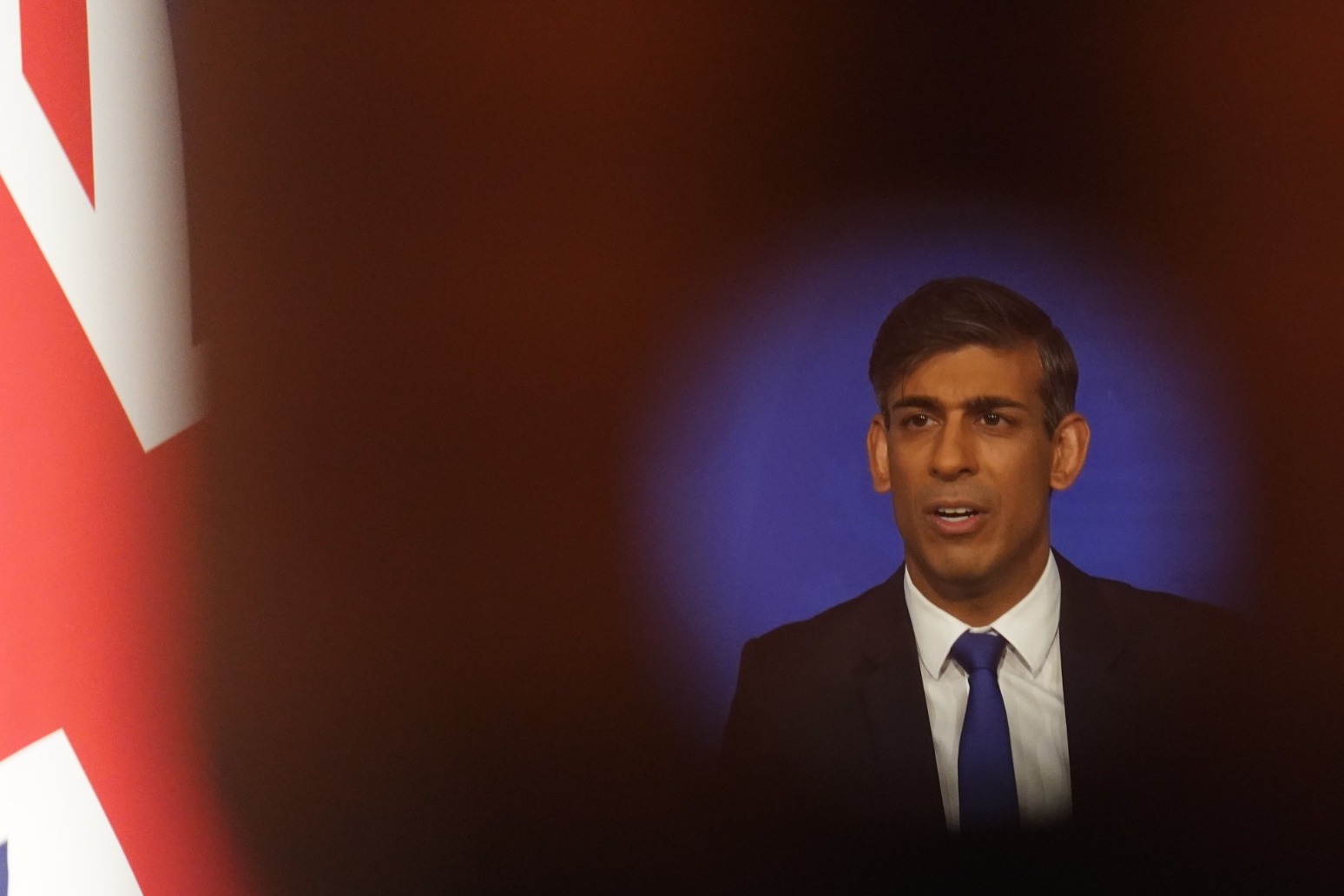
A defiant Rishi Sunak has vowed to “finish the job” of getting the Rwanda scheme off the ground despite opposition from hardline Tories and the prospect of a bitter parliamentary battle.
The Prime Minister, whose immigration minister Robert Jenrick quit rather than backing a plan which he believed was destined for failure, insisted his new law would end the “merry-go-round of legal challenges”.
The Government hopes to rush emergency legislation through Parliament for MPs and peers to declare that Rwanda is a safe destination for asylum seekers.
In the Commons, Tory hardliners may seek to beef up the Bill by calling for it to effectively override international law – something which Mr Jenrick and former home secretary Suella Braverman have argued for.
MPs will get their first chance to debate and vote on the Safety of Rwanda (Asylum and Immigration) Bill on Tuesday.
The legislation is likely to run into difficulties when it makes it to the Lords, where the Government has frequently struggled to get Bills through unscathed.
Pressed on whether he would call a general election if the passage of the legislation was frustrated, Mr Sunak told a Downing Street press conference: “We’ve got to finish the job and I’m going to see this thing through.
“I’m confident I can get this thing done.”
The Prime Minister called the press conference to speak directly to the nation as he sought to restore his authority in his own party following the resignation of Mr Jenrick and the sacking of Mrs Braverman.
He attempted to minimise the differences between his position and those on the right of the party who would like the legislation to set aside international agreements such as the Refugee Convention and the European Convention on Human Rights.
Mr Sunak said doing that would jeopardise the treaty his Government had signed with Rwanda as part of the plan to address the concerns of the Supreme Court, which had ruled against the scheme.
Addressing his critics, Mr Sunak said: “For the people who say ‘you should do something different’, the difference between them and me is an inch, given everything that we have closed. We’re talking about an inch.
“That inch, by the way, is the difference between the Rwandans participating in this scheme and not.”
He said the Bill “blocks every single reason that has ever been used” to prevent flights to Rwanda.
Accepting there could still be legal challenges, he said: “The only extremely narrow exception will be if you can prove with credible and compelling evidence that you specifically have a real and imminent risk of serious and irreversible harm.”
Mrs Braverman declared that “ultimately this Bill will fail” as she took to the airwaves to attack the plans of the Prime Minister who sacked her as home secretary last month.
She told BBC Radio 4’s Today programme that in the “very litigious field” of asylum law “the reality is and the sorry truth is that it won’t work and it will not stop the boats”.
Mere tweaks to the Rwanda plan will not be enough to get people on the plane to the east African nation, Mrs Braverman said, adding that the new legislation would still allow legal claims that could block flights and “clog up the system”, potentially for years.
“We can’t do half-measures. We have to totally exclude international law – the Refugee Convention, other broader avenues of legal challenge,” she said.
Under the Government’s plan, first unveiled in April 2022, people who arrive in the UK by irregular means, such as on small boats, could be sent on a one-way trip to Rwanda, where the Kigali government would decide on their refugee status.
The Bill, initially unveiled in draft form on Wednesday, compels judges to treat Rwanda as a safe country after the Supreme Court ruled the scheme was unlawful over risks to refugees.
The legislation, which must be voted on by Parliament, gives ministers the powers to disregard sections of the Human Rights Act.
It does not go as far as allowing them to dismiss the European Convention on Human Rights.
Mr Jenrick, an old ally of Mr Sunak, resigned just hours after the publication of the legislation, saying it “does not go far enough” and is a “triumph of hope over experience”.
The scale of unease on the right of the party over the Rwanda plan has led to speculation about a no-confidence vote in Mr Sunak’s leadership – something that would require 53 Tory MPs to trigger.
Cabinet minister Chris Heaton-Harris played down that prospect, telling LBC: “I think it’s highly unlikely, very unlikely. I’d say vanishingly small.”
Mr Sunak attempted to shift the focus onto Labour’s position when the legislation reaches Parliament.
Asked whether he would remove the whip from Conservative MPs who voted against the Bill, he said: “No, but what this vote is about is about confidence in Parliament to demonstrate that it gets the British people’s frustration.
“I get it, I’m acting on it.
“This is our deterrent, we are doing everything we can to get it on the statute books and get it up and running, so the question for votes in Parliament is what is the Labour Party’s plan and are they going to back this legislations
Published: by Radio NewsHub









